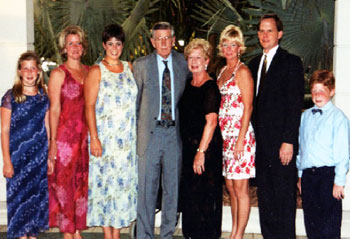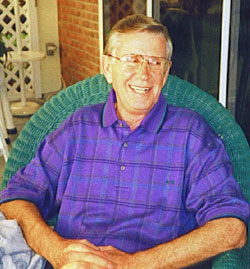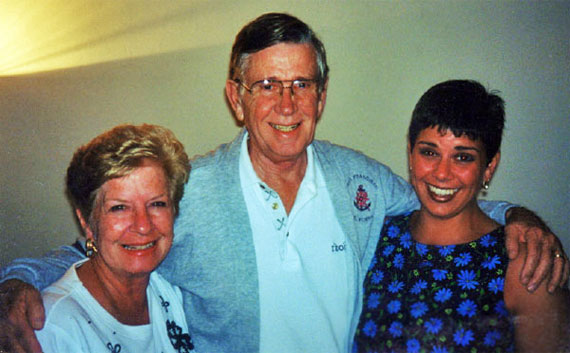Carroll Brent
by Suzanne Brent
When people ask me about my dad, Carroll Brent, I feel I stand a bit taller and smile a bit wider. This is a story not only about my dad’s life and his battle with PSP, but a story about my family and how we loved, lived, learned, and lost.
My dad, like most dads, was often heard saying “clean your room, wash the car, do your homework, turn off the lights, money doesn’t grow on trees.” Dad was a huge Kentucky Wildcat fan, he loved his family, his cars, the garden; he was a self-proclaimed carpenter and fence builder. Dad loved being outdoors; spring and summer were by far his favorite seasons.
My parents have four children and I am the youngest. My siblings were already in college and starting their careers by the time I started middle school. Dad owned and operated a car leasing company. Our mom, a nurse by profession, was required to travel several times a month by her job. Therefore, Dad and I spent quite a bit of time together. As a teenager and parent, there was arguing, but we generally enjoyed our time together.
I suppose it was only natural that I began to notice the small changes in Dad because I was with him so much. I remember saying to my mom and siblings, “something is wrong with Daddy.” In the beginning, the changes were so small that most people would not notice, but our family did. Dad began to get angry about the smallest things and it was never the same thing twice. It was like walking around on pins and needles; we never knew what would upset him. Dad began to lose interest in the things he loved the most and began to withdraw from family and friends. He would tell us he did not feel right but could never say exactly what it was that was bothering him.
Doctors told our family that Dad was depressed, so they tried antidepressants, which did not work. Doctors suggested in-patient treatment and shock therapy. As his family, we would do anything to help him feel better, so we followed the doctors’ suggestions. Those two weeks that Dad was in the psychiatric ward in the hospital were torture for all of us, leaving him there was horrible; even more so when the treatment did not make him better.

My Mom made a call to her primary care physician and told her, “my husband is going away, I need help.” Dad’s hands began to tremble and his gait was off. This time, the doctors said it was Parkinson’s. Again, the prescribed treatments did not work. The doctors were wrong and Dad’s condition was getting worse. Mom recalls a time when Dad threw her crystal vase in the dumpster, yet laid the dead flowers on the bench in the garage. He no longer had his business and could not hold a job. He began having small fender benders and, at one point, forgot where he had dropped one of the family cars for servicing. We never saw the car again. Then came another diagnosis – Alzheimer’s disease. “That’s what is wrong with your husband/dad,” they said. But we knew the Alzheimer’s diagnosis did not explain his balance problems and his tendency to fall backwards. Then there was that stare he had, as if he was looking right through you, instead of at you.
God watches out for us even when we feel he is breaking our hearts. Mom was offered a job in Orlando, Florida in 1998. It was hard to see my parents move away, and later we learned that the move was the blessing we had been looking for, but also the curse we had been afraid of hearing. Mom and Dad saw a neurologist at the University of Florida in 1999. Dad’s downward eye movement and balance problem told the doctor all he needed to know. PSP was the diagnosis. There was no known cause, treatment, or cure.
We all did our research. Mom asked all the questions any of us could think of, but we had to figure out the bottom line as it came. The symptoms developed faster than any of us expected; the father and husband our family knew was leaving us right before our eyes. There were so many times I asked God, “why us, why my Daddy?”
On November 4, 2001, Dad fell trying to get around by himself. His head had hit a doorknob on the way down, which fractured his scull, severed his eyelid, and gave him other cuts and bruises. Dad spent six weeks in the hospital, with Mom staying right by his side. We sent cards and letters encouraging Dad to get better so that he could come back to Kentucky for Christmas. My mom has to be the strongest woman I know. She took care of Dad every day, protecting all of us from the truth that was becoming our father. Mom was able to bring Dad to Kentucky for Christmas that year and although he spent most of his time in bed, we all got our Christmas wish: Mom and Dad home for the holidays.
We said goodbye to them in the security line at the airport. I took Dad’s winter coat; he would not need it in Florida. I hugged my mom, thanked her for being so strong. Then I walked over to my dad, who was sitting in his wheelchair. I hugged him, kissed him, and told him I loved him. I clung to my brother and cried as we left the terminal. I walked away that day knowing I would never see him again. 
Six weeks after that tearful goodbye, Dad lost his battle with PSP. Carroll L. Brent, husband, father, “Pop,” uncle, brother, and friend died Friday morning, February 8, 2002.
When people ask me about my dad, I stand tall and feel extremely proud and I smile wider. I once asked God, “why us, why my daddy?” I now know the answer. My dad’s PSP gave our family the opportunity to help others by educating, supporting, and assisting in fundraising efforts. I promised my dad the night before he died that I would make sure that people heard his story; and I that I would help others learn about PSP and how it affects families – families just like ours.
Thank you for helping me keep the promise I made to my dad. Thank you for helping me keep him alive in our hearts by allowing me to tell his story. If our family’s story of PSP can help one other family, or help to raise even one dollar for the vital programs of CurePSP, then I know that my daddy did not die in vain.
